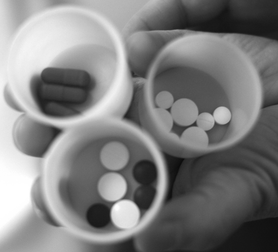
Tuberculosis patients who swallow their anti-TB pills under the watchful gaze of health care workers fare just as well as patients trusted to self-medicate, according to a new meta-analysis.
"Do we still need to observe patients taking their pills? Our findings are that's probably not as useful and we could direct resources to other interventions that would be more cost-effective," said study co-author Dr. Tawanda Gumbo from the University of Texas Southwestern Medical Center.
The analysis included data from 10 studies covering 8,774 TB patients observed to take their pills and 3,708 TB patients who took treatments on their own.
For both groups, the researchers examined whether pulmonary Mycobacterium tuberculosis had been eradicated, and whether patients relapsed or developed drug-resistant TB.
The patients did as well on all three counts whether health care workers witnessed them swallowing their anti-TB pills or they were allowed to take the pills on their own, Dr. Gumbo's group reported March 13th in Clinical Infectious Diseases.
Observing patients taking their drugs, a resource-intensive practice, is thought to help patients adhere to their medication regimens that last a minimum of six months. Critics of the approach say that allowing TB patients to take their own medications is just as effective and costs less, and more attention should be paid to improving the TB treatments themselves.
"Let's take those resources watching patients take their pills and start looking at why patients are failing therapy and drug resistance remains," Dr. Gumbo told Reuters Health.
Dr. Gumbo proposes personalized TB treatments that move away from a one-pill-fits-all approach. Since people metabolize TB drugs differently, the doses and timing of their medications should be adjusted accordingly.
His group is currently estimating the cost savings and feasibility of a personalized system in a population in South Africa.
"The system would be able to recoup its cost via treating fewer drug-resistant tuberculosis patients," Dr. Gumbo said.
The new pill-watching analysis contributes to an ongoing debate over whether doctor-observed treatment is worth the resources, experts said.
Directly observed therapy is more beneficial in richer countries like the U.S., where the global TB epidemic is concentrated among a relatively small number of recalcitrant patients, according to Dr. William Bishai, director of the KwaZulu-Natal Research Institute for Tuberculosis and HIV, an independent research institute in Durban, South Africa.
In a poorer country like South Africa, where TB rates are nearly 300 times that in the U.S., watching patients take pills may divert crucial resources.
"When you withdraw services such as directly observed therapy in a rich country, the epidemic comes back with a vengeance," Dr. Bishai told Reuters Health. But, he said, "It's a worthwhile debate as to the cost-benefit ratio between (directly observed therapy) and self-administered therapy in a resource-poor country."
As for personalizing TB treatment, Dr. Bishai is doubtful. If it's not cheap and set up so "that someone in a dusty clinic in rural Africa can get the results in an under-resourced clinic, then it's just not going to happen with current resources," he said.Some health experts instead advocate community-based approaches that avoid making patients feel untrusted and patronized. In some cases, Dr. Bishai explained, laypeople from the affected community, who are trained to act as something akin to midwives, see new patients through the entire process from diagnosis to recovery.
"Direct observation in and of itself is not magical, it's an opportunity to establish a relationship between a health care provider or trained layperson and a patient," said Dr. Carole Mitnick, an assistant professor of global health and social medicine at Harvard Medical School. Dr. Mitnick was not involved in the current study.
"If that is used as a broader support system, direct observation certainly can have benefits," she told Reuters Health.
SOURCE: http://bit.ly/10IXe1c
Clin Infect Dis 2013.
Source: Medscape Today